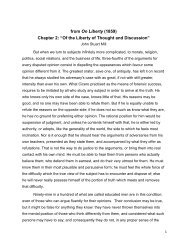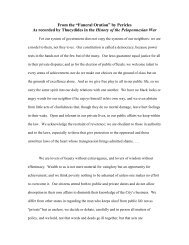Rousseau_contrat-social
You also want an ePaper? Increase the reach of your titles
YUMPU automatically turns print PDFs into web optimized ePapers that Google loves.
included the rich, the last the poor, and those between persons of<br />
moderate means. These six classes were subdivided into one hundred and<br />
ninety-three other bodies, called centuries, which were so divided that<br />
the first class alone comprised more than half of them, while the last<br />
comprised only one. Thus the class that had the smallest number of<br />
members had the largest number of centuries, and the whole of the last<br />
class only counted as a single subdivision, although it alone included<br />
more than half the inhabitants of Rome.<br />
In order that the people might have the less insight into the results of<br />
this arrangement, Servius tried to give it a military tone: in the<br />
second class he inserted two centuries of armourers, and in the fourth<br />
two of makers of instruments of war: in each class, except the last, he<br />
distinguished young and old, that is, those who were under an obligation<br />
to bear arms and those whose age gave them legal exemption. It was this<br />
distinction, rather than that of wealth, which required frequent<br />
repetition of the census or counting. Lastly, he ordered that the<br />
assembly should be held in the Campus Martius, and that all who were of<br />
age to serve should come there armed.<br />
The reason for his not making in the last class also the division of<br />
young and old was that the populace, of whom it was composed, was not<br />
given the right to bear arms for its country: a man had to possess a<br />
hearth to acquire the right to defend it, and of all the troops of<br />
beggars who to-day lend lustre to the armies of kings, there is perhaps<br />
not one who would not have been driven with scorn out of a Roman cohort,<br />
at a time when soldiers were the defenders of liberty.<br />
In this last class, however, proletarians were distinguished from capite<br />
censi. The former, not quite reduced to nothing, at least gave the State<br />
citizens, and sometimes, when the need was pressing, even soldiers.<br />
Those who had nothing at all, and could be numbered only by counting<br />
heads, were regarded as of absolutely no account, and Marius was the<br />
first who stooped to enrol them.<br />
Without deciding now whether this third arrangement was good or bad in<br />
itself, I think I may assert that it could have been made practicable<br />
91











